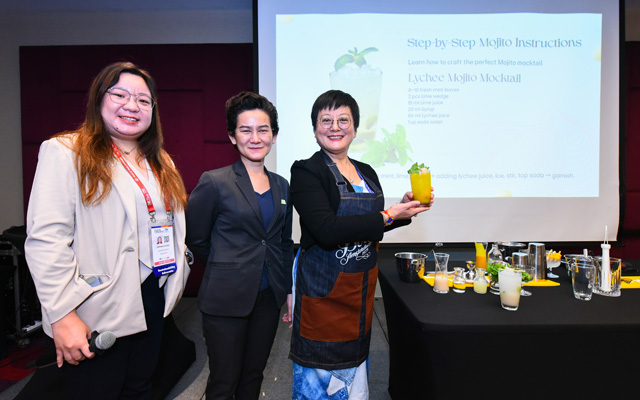Food is central to every conference, yet the way it is sourced, served, and wasted is now under sharper scrutiny.
At IT&CM Asia and CTW APAC 2025 last week, ICCA’s Sustainable Gastronomy in MICE engagement activity highlighted how the industry can reshape its practices. The session combined hands-on activities with honest knowledge-sharing from venues, consultants, and hoteliers.

The session opened with an eco-mocktail demonstration, showcasing how hyperlocal produce can cut carbon footprints along the supply chain while elevating the delegate experience.
But the bigger challenge, said LightBlue Consulting founder Benjamin Lephilibert, lies in food waste, which accounts for eight to ten per cent of global greenhouse gas emissions.
“Reducing food waste is not just transforming it into compost – it is anticipating, identifying the root causes, and embedding better procedures. Prevention is the top priority. Redistribution comes next. Only after that should we talk about animal feed or soil recovery,” Lephilibert explained.
ICCA’s regional director for Asia Pacific, Waikin Wong, steered the discussion to the audience, gathering candid examples of cultural expectations, buffet logistics, and plate waste.
“It’s crucial for organisers to start the dialogue with venues. Some venues may lack experience or not know the right questions to ask – so bridging that gap and educating each other is where communication becomes essential,” she said.
Hotels face the sharp end of the issue. Pornticha Wongyannava, sustainability manager at Bangkok Marriott Marquis Queen’s Park, said: “Preparation waste we can compost, buffet waste we can donate. But plate waste goes to animal feed at best. Educating guests to take only what they can finish is critical.”
She further highlighted: “We even upcycle oyster shells into fire-resistant paint for local schools. This example also makes a good talking point to initiate the dialogue with our guests and vendors about food waste.”
From the venue perspective, Eileen Quek, assistant director of sales (international) at Singapore Expo, noted that cost remains a barrier: “Everyone wants to go sustainable, but no one wants to pay for it. That’s why we took it upon ourselves to make the initial investment in a food waste digester, which first produced fertiliser and now creates grey water safely released into the public system.”
She added: “On our site, it’s all about data and information, so I would highly encourage event organisers to think of F&B as part of your event design at the beginning. Because not only do good food and a good experience make your event; leave it to the end, and you lose the chance to shape impact.”
The session also spotlighted the ICCA Food-Waste Management Toolkit for Associations, developed with LightBlue Consulting and launched in July 2025.













